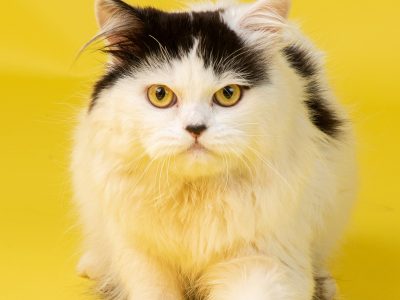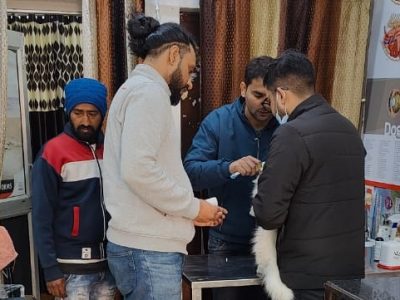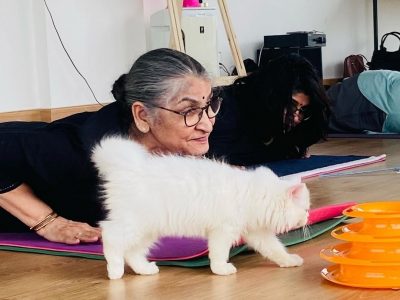Move over dogs, here come the cats.
Metropolitan cities like Delhi are witnessing an increase in pet cats due to their easy availability and low maintenance compared to dogs. The rise in demand has been significant after Covid as people searched for a solution for depression and anxiety.
“It’s true that the number of cats has increased since the pandemic. The demand is still continuing. Earlier, we would treat one or two cats a day in our OPD but after the pandemic we are treating 20-25 cats daily,” said Dr Sanjay Kumar, who works in Max Vets Hospital, East of Kailash.
Mohammad Bilal, who has been selling and adopting cats for around a decade, concurs with Kumar’s view.
“The demand for cats has increased. I sell around 35 cats a year. These could be Moroccan, Thai or Persian among others. Besides, I give out 15-20 cats for adoption. When the pandemic struck in 2020, people suddenly started calling me for cats. I had 10-12 cats at that time and they got sold in 5-7 days. The high demand has continued since then and there has been no decrease in cat sales,” said Bilal, who stays in Jamia Nagar and caters to clients in Gurugram.

He also sent a cat to Singapore three months ago.
‘House of Stray Animals’ is a Noida-based NGO that works for the welfare of stray animals. A member of the NGO confirmed to Patriot that demand for cats has increased since lockdown.
“We give around 3-4 cats to people for adoption every month,” he said.
How cats help
Anu Gehlot, a Delhi-based clinical psychologist, said that pets help with mental health.
“Pets have a very strong impact on our mental health and it was evident during the pandemic when loneliness, which can be really distressing, caused serious mental health issues,” said Anu.
“People resorted to having more pets during and after the pandemic, since that sense of connection helped a lot of people get through emotionally and mentally. Having a pet can have the same impact on the neurochemistry of the brain as loving a human being.”
Cat yoga or yoga practiced in the company of cats is also gaining popularity.
A few friends from Vasant Kunj got together and started a weekly yoga session, where people would come with their cats for the traditional Indian exercise.
“We have been pet lovers for a long time. We feed pets. I, along with two others, started this around six months ago,” Noori, an organiser of cat yoga, said.
Noori was introduced to cat yoga on her visit to London. Once she started this initiative on return, she found great response.
“Everyone is busy in their life. Keeping a dog means you need to go with it for a walk outside. Maintaining a routine with dogs is a little tough. Cats are independent. Dogs also contribute to bad odour at home. Since working people don’t have enough time to clean or bathe the dog every weekend, they prefer cats.”
Noori added that they also gave out cats for adoption during the cat yoga sessions. She would hand them after cleaning and proper vaccination.
“At least two people would adopt cats in every session. We are lucky that all the cats are in very good homes and living peacefully,” she said.
She has had to discontinue giving out cats for adoption due to her busy work schedule.
Surabhi Sachdeva, who is a trainer in cat yoga in Gurugram, explains the exercise in detail.
“We do yoga very gently. In this type of yoga session, people come with their pet cats who can run here and there while the session is on. So, it helps people in doing yoga in a relaxed atmosphere and with a smile. I have not seen as many people smiling at one time as when they did cat yoga. Interestingly, even those people, who don’t want to move their body, end up moving it in this session,” she said.
Surabhi, who has been teaching yoga for 6-7 years now, added, “People suffer from diabetes, depression due to stress in everyday life. City life is difficult. It’s scientifically proven that animals can help relieve it. So, the idea to start cat yoga was to ensure that pet lovers play with cats during yoga. People feel relaxed during cat yoga sessions. It’s like a workshop and people feel different experiences.”
Bonding with cats
A survey conducted by the Waltham Foundation post Covid found that 86% of respondents felt they had bonded more with their animals since being in lockdown, while 60% thought their pet had helped them maintain a regular routine and 43% said that their animal had reduced their anxiety.
Aditi Sharma, who hails from Gwalior and lives in Vasant Kunj, had never experienced a cat in her life before adopting a couple of them two years ago.
“My life changed after adopting the cats. I feel much happier now than before. Earlier, I felt depressed at home and often wanted to go outside with friends. But now I want to return home first, because I feel my kids (cats) are waiting,” said the 33-year-old Aditi.
Aditi, who is in Gwalior for the past few months to tend to her parents, has taken the cats along with her.

“Dogs have liabilities as they want to walk outside. Cats, on the other hand, are independent. Also, there is no need to train cats but you need to train dogs. Even in my case, my cats follow me to the washroom and do it themselves now.”
Aditi got hooked to cats after she fractured a limb and was unable to venture out. She needed a companion at home. She used social media to inform people about her requirements.
“I suffered a fracture and was unable to venture out of my home. I needed a companion. So, I posted on social media regarding this. Since I had never kept pet cats, I had no idea what they ate or did. But when my senior, who kept cats, recommended these two cats to me, I did.”
Aditi works for 12 hours and while she is busy, the cats care for each other in her absence.
“My family always kept dogs, but I think cats are very comforting. They love me when I return from work and I feel good. They also wake me up in the morning. I don’t need an alarm now. Compared to others, cats are much more sensible. Also, cats require low maintenance. I never feel disturbed by cats,” she said.
Initially, people would ask her about her unusual choice of pet. But with time, they started to appreciate her animals. She makes sure to open the door at 5 pm. Both the cats go outside to walk and return without causing any disturbance to anyone.
Siddharth, a professional photographer, who lives in south Delhi, used social media like Aditi to adopt a cat.
“I felt the need for a cat during Covid. Because at that time, I was stuck in my house and there was no connection with the extended family outside except through calls. When the cat became my companion, we managed Covid better. Definitely, cats have become a part of my emotional support system,” he told Patriot.
Siddharth, however, added that there are many people who dislike pets, and there have been incidents where people have fought over pets, especially dogs.
“I haven’t faced this problem yet. My cats generally don’t go far and stay inside the house mostly. So, there is no chance of barking or biting anyone.”
Physiotherapist Gaurav Verma, who has been keeping pets for over a decade now, pointed out that dogs are very energetic and fond of going outside, while cats can be easily kept in a closed space such as a room.
“So, when people complained of loneliness during the Covid lockdown, I advised them to keep cats. Many adopted cats,” he said.
“Cats take time to become familiar. If you try to hold them in your hands without getting familiar with them, they can bite. Gaining trust of cats is tough but once you gain it, things begin to work,” added Verma, who is also a cat enthusiast.
He complained that a lot of people chain their expensive breed of cats, like Persian cats.
Surge in future demand
The demand for cats is likely to increase in future.
Dr Riyaz, who has been running a vet clinic in Sarita Vihar for over five years now, said, “I think cats will be the major pet in the next 10 years. After Covid, the number of pet cats has increased. The reason is that they need less space, are easy to handle and care. I would treat around 3-4 cats per day in our OPD in 2018-2019, but now I treat 15-20 cats a day.”
He said that out of every 25 pets he receives in his OPD, at least 17-18 of them are cats.
However, Tanya Singh, founder of ‘Paw Saviour Foundation’, which works only for cats in the Chhatarpur area, said that many people tend to abandon cats.

“Many people want to adopt cats only as pastime and abandon them after 2-4 months. Love for cats has increased in the society but there are many loopholes like lack of safety, care, awareness among others. Also, many adopt to only flaunt and don’t care properly,” said Tanya, who has 100 cats.
Ramakant, who runs Zotails — Luxury Care for Pets, a store in West Patel Nagar, provides facilities such as grooming, vet consultancy and pet food, besides accessories among other things.
“There has been an increase among cat lovers compared to previous year. If there was a 20% sale of cat items last year, it has increased to 25% this year. People are slowly shifting towards cats,” he told Patriot.
Lakshay, who runs Sicons — The Pet Safari, a pet accessories store, however has experienced a relative decline in demand for cat items post Covid lockdown.
“People adopted the cat in lockdown and when the lockdown ended, they released them,” he said.





